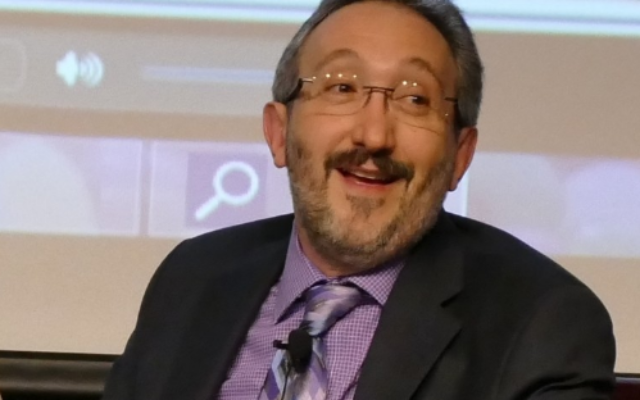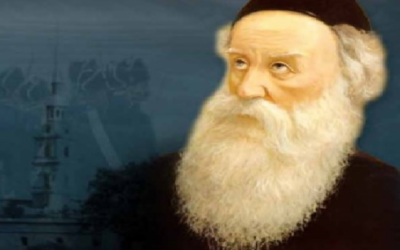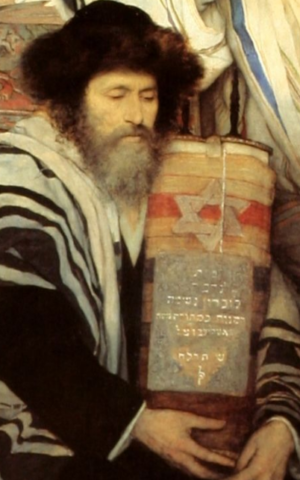Rabbinic Family Tradition for Almost 300 Years
Rabbi Mark Zimmerman of Congregation Beth Shalom traces ancestry to legendary religious leader.

When Rabbi Mark Zimmerman’s grandfather left the Soviet Union in 1930, he was just one step ahead of the secret police. Zimmerman, who is the long-serving spiritual leader of Congregation Beth Shalom, said Stalin’s police had arrested his grandfather in the little shtetl where he was the rabbi. To help him escape, his grandfather’s congregants pooled what little money they had and bribed the jailers.
“The Soviet authorities were ready to execute him the next morning,” Rabbi Zimmerman said. “But the people in the shtetl smuggled him out and managed to arrange for him to get on a freighter bound for Canada.”
Eventually he made his way to Toronto, where he became a respected Talmudic scholar and a prominent member of the Jewish community. The story of his grandfather’s narrow escape has become for Zimmerman just another milestone in his family’s long rabbinic history. In fact, the rabbi of the Conservative Dunwoody synagogue traces his long heritage of religious leadership back to 18th-century Rabbi Pinchas Shapiro of Koretz who was known as “The Great Rabbi Pinchas.”
He was among the most brilliant early disciples of Rabbi Israel ben Eliezer, the Baal Shem Tov, the founder of Hasidism, the revolutionary movement that transformed the religious life of many poor Jews in Eastern Europe. According to Zimmerman, Rabbi Shapiro has received considerable attention in the modern era.
“He’s known as a very humble rabbi who was very quiet and kept to himself, but Elie Wiesel has written about him in his book on Hasidism called ‘Souls on Fire.’ I am directly descended from that rabbi, and it goes back somewhere between 12 and 13 generations, maybe a little more, because we’ve lost some of the history in the middle there.”

There is said to be little reliable biographic material about Zimmerman’s illustrious ancestor, but he was described as a righteous man “who was from the earth and grew up in the heavens.”
Although the congregational leader of Beth Shalom had a father as well as a grandfather who were well known rabbis, they discouraged Zimmerman from following in their footsteps.
“I was always on the bimah with my dad. And I kind of always thought that I might become a rabbi. But my dad also spent much of his life saying, ‘Mark, be a synagogue president, drive the rabbi crazy. You don’t need this world; be a doctor, be a lawyer or be a pharmacist. Why in the blazes would you want to be a rabbi? It’s a hard life.’”
In fact, Zimmerman was well along in his studies in computer science when he finally made a decision that “computers were not for me. I didn’t want to spend my life with math and coding.”
He came to Atlanta in 1988 at the age of 29, not long after graduation from the Jewish Theological Seminary. Although he has spent nearly his entire career as Beth Shalom’s rabbi, his first love is Jewish religious music.
He said he “grew up really steeped in this cantorial tradition” that is said to reach its highest expression during the worship services of the high holidays.
“I was trained as a chazzan, a cantor, by my dad. I’ve sung with our synagogue choir. My dad went to The Royal Conservatory of Music in Toronto, and one of his classmates was the great Metropolitan Opera star Richard Tucker, who also trained as a cantor.”
But just like his father and his grandfather, Rabbi Zimmerman has not

encouraged his children to join him in the rabbinate. His son, instead, has followed his father’s early interests in computer science and works in Israel. Zimmerman said his two daughters have their own career interests.
“I said to my kids, you don’t want to go into the rabbinate just because you think it’s the natural thing to do. You want to explore other things and do whatever. You have to love this job to be in this job.”
And besides, the rabbi maintains, Judaism has gone through a series of momentous changes in recent years that would have made the religion almost unrecognizable to the many generations of rabbis in Zimmerman’s family, particularly those who were brought up in the religious traditions of the Eastern Europe’s shtetls and the old, traditional world of Hasidism.
“Today Jews have a lot of multiple identities. I mean, there are people for whom Judaism is about their connection to Israel. There are those who see Judaism as the connection to tikkun olam, repairing the world through social action. There are those whose Judaism is connected to ritual behaviorism, much more than traditional orthodoxy. I am seeing today, within my community, basically all kinds. I mean, the American Jewish experience or experiments, if you will, is going in directions that nobody could have imagined.” ⎧



comments